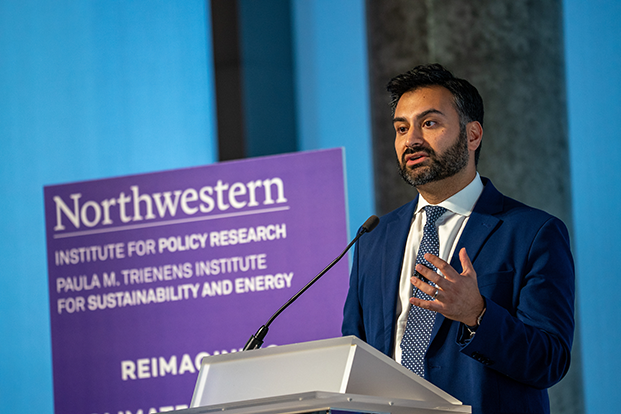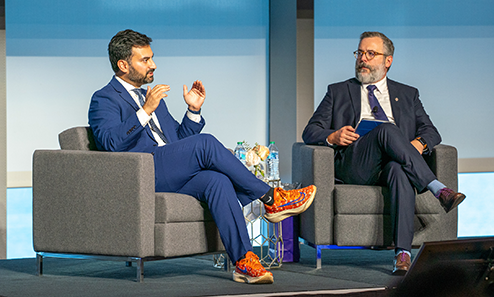Reimagining Climate Policy
Former national climate advisor Ali Zaidi sees opportunity beyond the ‘doom and gloom’ of climate-change disaster
Get all our news
This is not just a chance to put steel in the ground for a solar panel. It’s a chance to put steel in the spine of communities that have felt knocked down over decades of disinvestment.”
Ali Zaidi
Former White House National Climate Advisor
Watch the video:

Former White House National Climate Advisor Ali Zaidi discusses how innovation and collective action can drive climate solutions.
Asheville, North Carolina, was once considered a “climate haven.” Nestled in the Blue Ridge Mountains more than 250 miles from the Atlantic coast, it appeared safe from the worst effects of a warming planet. That illusion collapsed in September 2024 when Hurricane Helene unleashed catastrophic floods across the region.
In a recent lecture at Northwestern University, former White House National Climate Advisor Ali Zaidi pointed to Asheville as a stark example of climate change’s expanding impact.
“There’s no place that’s too far north to feel the impacts of extreme heat,” Zaidi said, speaking to more than 180 students, faculty, staff, and community members on Sept. 30. “There’s no place that’s too flat to be impervious to wildfire risk. There’s no place too inland to be sheltered from the next storm.”
Zaidi’s lecture was part of the University’s Distinguished Public Policy Lecture Series, jointly hosted by the Institute for Policy Research (IPR) and the Paula M. Trienens Institute for Sustainability and Energy, with support from the Kellogg School of Management’s Abrams Climate Academy.
Northwestern’s Vice President for Research Eric Perreault introduced Zaidi by highlighting his career at the intersection of science and policy. From 2022 to 2025, Zaidi served as assistant to the president and U.S. national climate advisor, heading the White House Climate Policy Office and serving as former President Joe Biden's top advisor on domestic climate policy.
“That path from science to policy is emblematic, not only to the partnership between Trienens and IPR, but also to what we strive to do at Northwestern,” Perreault said. “We take fundamental breakthroughs and use them to have an impact on society.”
IPR Director Andrew Papachristos emphasized the importance of Zaidi’s visit.
“Today, we're going to turn our attention again to climate change, which really continues to be one of the most urgent challenges we face,” Papachristos said.
Opportunities in Climate Policy
The costs of climate change are rising dramatically, with hundreds of billions of dollars being spent annually on disaster aid, Zaidi said. Hurricane Helene alone racked up $79 billion in damages.
The dollars matter, but the deeper impact is human. “People are hurting,” he said.
Zaidi suggested that these costs—both economic and personal—could be reduced if the country invests in climate solutions that prevent or lessen the severity of future disasters. By cutting emissions and building resilience, the U.S. has a chance not only to avoid damage but also to unlock long-term social and economic benefits.
He urged the audience to look beyond the “doom and gloom” and recognize the potential for transformation. “There is a massive opportunity for us to promote wellbeing, prosperity, a coming together of our communities,” he said.
This moment, Zaidi said, sets the stage for deeper investment in clean air and water and economic development.
“This is not just a chance to put steel in the ground for a solar panel,” he said. “It’s a chance to put steel in the spine of communities that have felt knocked down over decades of disinvestment.”
Zaidi pointed out that reducing emissions requires action across multiple sectors, such as power, transportation, real estate, and industry.

Ali Zaidi (left) sat down for a conversation after his lecture
with IPR Director Andrew Papachristos.
He described several such opportunities and transformations. For housing, he suggested locating developments near workplaces to reduce commutes. In the transportation sector, battery costs have dropped 80–90% over the past decade, making electric vehicles more cost competitive with gas-powered cars. Shipping now has a global system of carbon pricing, and aviation is developing sustainable fuel. Agriculture is relying on climate-smart techniques like precision farming and cover cropping to reduce emissions and improve productivity.
AI and the Future of Climate Solutions
Zaidi acknowledged the tension between artificial intelligence (AI) and climate change advocacy, but he argued that AI also offers powerful tools to speed up climate solutions. AI carries a large carbon footprint, and the rapid expansion of AI technologies—particularly data centers and chip manufacturing—is driving up electricity demand and straining the energy grid.
He recognized the unique value of AI during a trip to South America with former President Joe Biden. He recalled hovering over the “magnificent” Amazon rainforest in Marine One and seeing the “scarring of climate change” in the charred and fragmented tree canopy.
“We see it in small ways; fingerprints here on the lakes, everywhere,” Zaidi said. “But to see it on this—the lungs of the Earth—was pretty jarring.”
Zaidi met with Indigenous leaders who, using satellites, advanced data processing, and AI, have found where loggers are illegally clear-cutting forests—and then intervened to stop them. Such AI-powered monitoring systems could “empower Indigenous communities who've been left behind time and time again.”
The Next Generation
Zaidi ended by reflecting on the responsibility students and emerging leaders have to solve climate change, while recognizing the burden they are inheriting from previous generations.
“Your house is going to be on fire, and then the people in charge just didn’t do anything about it, and now you’re inheriting this massive deficit,” he said.
Yet he also sees hope. In January 2025, his last month in office, he met a young woman from Asheville. Hurricane Helene had knocked down her family and community. But she chose action over hopelessness.
“She decided to enlist in national service to give back, to boost the resilience of her community, to make sure that they were less vulnerable in the face of the next storm,” Zaidi said. “That's the hopefulness that I see every time I'm around young people.”
Zaidi encouraged students to take full advantage of their time at Northwestern, calling it a rare privilege to be surrounded by brilliant minds and opportunities to dive deep into complex challenges. He emphasized the importance of approaching climate work with both leadership and optimism. Rather than getting overwhelmed by the scale of the crisis, he urged them to recognize the potential for collective action and meaningful change.
“The impacts are here, the costs are mounting, but the solutions are so powerful,” he said. “They are within reach, and we can get after them if we do it together.”
Ali Zaidi is a professor of practice at the University of Pennsylvania. He was assistant to the president and U.S. national climate advisor from 2022 to 2025.
Photo credit: Rob Hart
Published: October 27, 2025.


